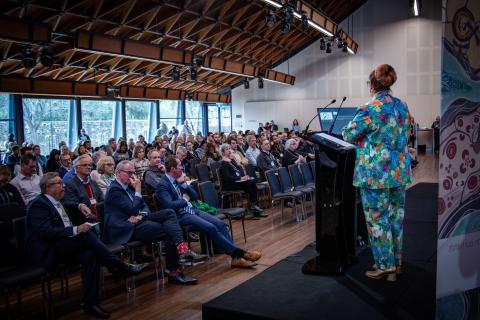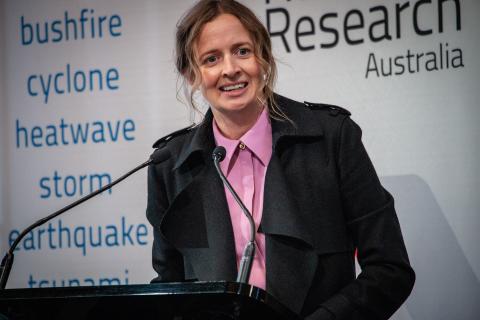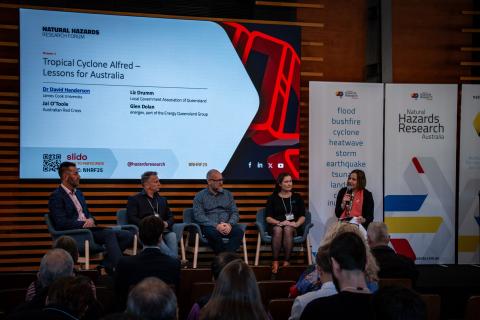


Strategic thought leadership headlined against a backdrop of increasingly frequent, severe and unpredictable natural hazards for Natural Hazards Research Australia’s annual Forum.
Australia’s pre-eminent meeting place for thought leadership and dialogue based on natural hazards research, the Natural Hazards Research Forum 25 (NHRF25), was held 18-20 June 2025 in Adelaide.
Now in its fourth year, NHRF25 drew upon more than two decades of funded research into natural hazards that affect community resilience and quality of life in Australia.
Across three days, more than 400 attendees from more than 200 organisations connected with leading research, reflected on lessons learned, and discussed how innovative research can support safer, more resilient and sustainable communities into the future.

“Utilisation of research findings is a priority for the Centre considering both the increasing number of research projects coming to completion and the repetition and reappearance of similar recommendations from enquiries and reviews after a natural hazard.”
Andrew Gissing, CEO, Natural Hazards Research Australia
With a Forum program that moved beyond transactional relationships and initiatives to transitions and integrated solutions covered more than 75 research projects, 25 commissioned research projects and more than 30 postgraduate projects from the Centre’s broader research program.
“Disaster risk reduction is moving from the context of ‘safety of individuals and property’ to problem-solving using a much broader risk-based approach, with clear tools, incentives and signals that action the insights.”
Professor Cheryl Desha, Science Innovation Director, Natural Hazards Research Australia
Local communities around Australia understand vulnerabilities, but not necessarily the risks they face. We need to inform policies and investment strategies going forward to address future risks and vulnerabilities. The Australian Disaster Resilience Index (ADRI), a groundbreaking tool developed in partnership between Natural Hazards Research Australia, the University of New England and the National Emergency Management Agency (NEMA), launched its first major update at NHRF25.
“ADRI-2 provides incredible potential as a policy support tool given its ability to provide organisations with current, evidence-based insights into how communities across Australia can prepare for, respond to and recover from natural disasters.”
Paul Gloyne, Assistant Coordinator-General Data Analytics and Chief Data Officer, National Emergency Management Agency
In the spirit of reconciliation, attendees participated in a Smoking Ceremony and Welcome to Country by Cliffy Wilson from Kuma Kaaru. The message sticks created for our first Forum in Brisbane in 2022 by Uncle Marcus lay centre stage throughout the Forum as an important symbol of shared values, knowledge sharing and safe passage through the sharing process.

Image: Cliffy Wilson
The Hon Emily Bourke, Minister for Emergency Services and Correctional Services, Minister for Autism, Minister for Recreation, Sport and Racing, officially opened the Forum, setting the scene for exploring bold and innovative approaches to address Australia’s future disaster resilience needs.

Image: The Hon Emily Bourke
End users and researchers were inspired to integrate innovative and bolder thinking into their work practice, using the outputs of Centre research and ‘walking the talk’ of the Be Ahead of Ready conversation.
"The Forum has been fantastic this year , it really feels like all of the work is being consolidated and is moving things forward and we can see shifts in the sector and it's very exciting."
Briget Tehan, Australian Red Cross
The Centre’s community of researchers and end-users connected, co-delivered research findings, and reconnected with colleagues to cultivate research ideas and foster research utilisation.
On resilient built communities,
"It's complex so that's why it hasn't been solved, but that's why Natural Hazards Research Australia exists to help us chip away at the problem until it can one day eventually be solved."
Dr Matthew Mason, University of Queensland and Natural Hazards Research Australia
Decision makers left more informed of upcoming research knowledge aimed at supporting future operational planning, policy setting and strategising.
"So much incredible research is underway. We heard from a diverse range of speakers around the need to locate our housing in areas that reduce risk, either from flood or other natural hazards. And how the lifeline systems that support communities such as power networks are resilient to severe wind and storms, and the role that alternate battery energy technologies can play in supporting communities to be more resilient. The Roundtable on Assisted Relocation brought together international and Australian researchers, practitioners and policy makers as we seek to learn lessons from current and previous practice, and understand the complexities of implementing these initiatives in partnership with communities."
Amanda Leck, Head, Adaptation, Mitigation and Reconstruction of the NSW Reconstruction Authority
We invite you to explore a collation of resources from NHRF25, including all panel session recordings, session presentations, session videos, photographs, and posters.
You are welcome to use the photos with credit to Natural Hazards Research Australia.
